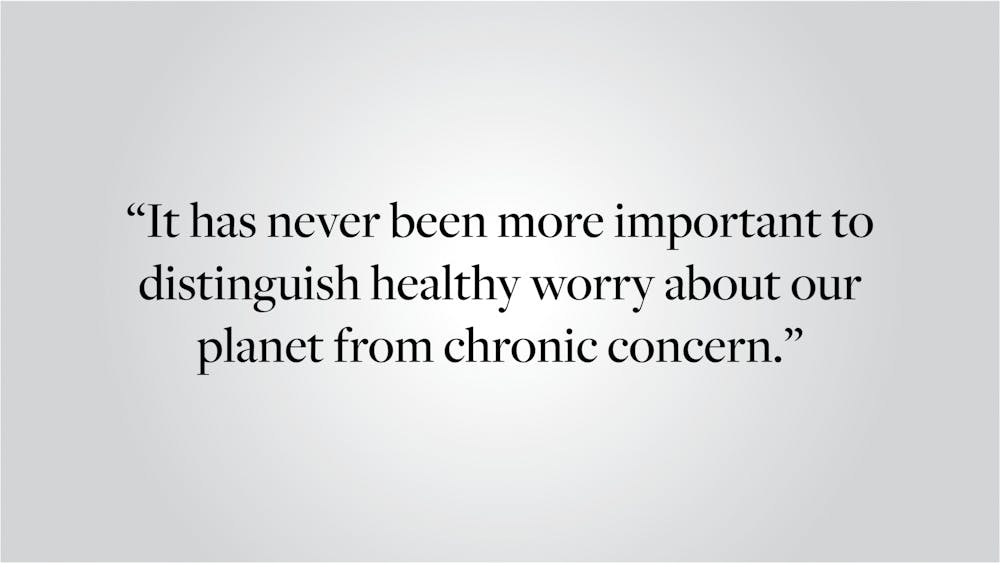It’s almost impossible to tune into the news these days without being forced to reckon with humanity’s role in perpetuating the climate crisis. Believe me, I don’t like hearing about my undeniable personal contribution to the degradation of our planet any more than the next person — yet, the spread of such information can be necessary to catalyze change. Unfortunately, for some, being faced with this data can be mentally debilitating, spurring climate anxiety: a psychological disorder connected to an individual’s concern about environmental calamity. As global temperatures rise and conditions worsen, humanity’s mental state is beginning to feel the heat. It has never been more important to distinguish healthy concern about our planet from chronic anxiety.
The present and future state of our environment presents significant cause for worry. Scientists estimate that the upper limit of warming that the planet could sustain is 2 degrees Celsius. Despite this fact, today’s policies currently have the world on track for a more than 3 degree rise in temperature. In the forms of wildfires, flooding and eroding coastlines, every slight increase in temperature will bring more climate devastation than the last, irreversibly altering life as we know it. A 2021 report in The Lancet, a medical journal, went so far as to state that “climate change will become the defining narrative of human health” — and for good reason. Temperatures have only risen a single degree since pre-industrial times, and public health is already suffering in countless ways. For example, a study in Nature Climate Change revealed that 37% of heat-related deaths can already be attributed to climate change. Rising extreme temperatures also significantly heighten the risk of maternal hospitalization during pregnancy.
In short, there is a well-established discourse surrounding the detrimental physical health effects of our rapidly changing climate. However, the discussion of climate change’s impacts on mental health is still in its nascent stages.
Anxiety disorders are the most common mental illnesses in the United States, impacting 18.1% of the population annually. Genetics, life events and brain chemistry are the most typical culprits for anxiety disorders, but a new cause is on the rise: our changing climate. Rather than promoting productivity and prompting individuals to foster positive environmental change, the growing onslaught of climate news has begun to trigger debilitating symptoms such as panic attacks, loss of appetite, insomnia and obsessive thinking for those suffering from climate anxiety. The condition isn’t a healthy level of worry that spurs fruitful action; instead, it’s a psychological disorder that is increasingly wreaking havoc on the American population.
Efforts to clinically address climate anxiety are expanding, even prompting the appearance of professional certification programs in climate psychology. Such developments are more than warranted — a new study by the American Psychiatric Association found that 55% of people are anxious about climate change’s impact on their mental health. Another study found that 45% of survey respondents’ daily lives are negatively affected by climate change. These growing anxieties have prompted some to seek therapy. For example, Caroline Wiese — an 18-year-old who recently began seeing a climate therapist — sought out help because her awareness of climate change repeatedly sent her into “multi-day panic episodes” that interfered with her life. Wiese cited not being able to function and needing therapy to soothe her daily anxiety.
Climate anxiety presents a special challenge because it is different from generalized anxiety in terms of its potential treatments. While there are many effective treatments for generalized anxiety disorder, those same treatments may be ineffective for patients suffering from climate anxiety. Those seeking to alleviate their climate anxiety can take advantage of traditional anxiety lifestyle and home remedies, such as keeping active, maintaining a healthy diet and getting regular sleep. However, one popular anxiety treatment — talking with a therapist — may not be viable, as some experts are still unprepared to respond to this relatively novel form of anxiety. Some patients have voiced concerns after trying to discuss their climate anxieties with long-time therapists, feeling that mental health professionals dismissed their fears as “exaggerated” or assumed they were projecting anxieties from other points in their lives onto climate change. Caroline Hickman, a psychotherapist and climate psychologist at the University of Bath, does not think this gap in anxiety therapy can be closed simply with more training. Many therapists cannot yet adequately discuss climate anxiety, as discussions with patients can stir up feelings of helplessness and anxiety for therapists themselves, according to Hickman. This nuanced difference between generalized and climate anxiety calls for novel treatments to be developed for this growing disorder.
When one thinks about the consequences of climate change, images of a worsening environment such as wildfires and floods come to mind. Yet, as stated by the CEO of the American Psychiatric Association, “the public … is beginning to understand the impact (global warming) has on overall health and mental health.” In other words, science is beginning to realize that climate change is a mental stressor as much as a physical one. With rising seas and increasing temperatures, concern about the fate of our planet is essential in order to curb a devastating fate. However, it is vital to remember that while a bit of worry is healthy, it must not overwhelm us. With cases of climate anxiety on the rise, two things are crucial. First, therapists should pursue climate psychology training in order to best serve their clients who are struggling with the condition and seeking help. Second, society must collectively strive to lessen its impact on the planet — calling on policymakers and corporations to take a stand against an unlivable future. With these solutions working hand-in-hand, hopefully humanity can mitigate and adapt to the burden of climate anxiety.
Brooke Nyman ’23 can be reached at brooke_nyman@brown.edu. Please send responses to this opinion to letters@browndailyherald.com and other op-eds to opinions@browndailyherald.com.





